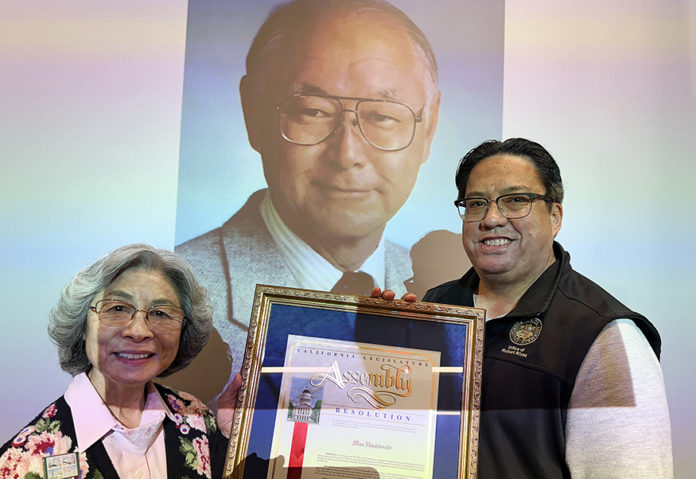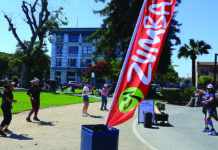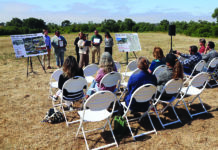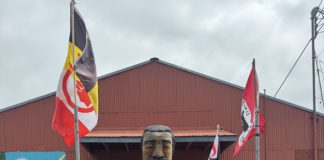
More than 200 people gathered Saturday in Watsonville’s Community Room to celebrate the life of Mas Hashimoto, who as a child was imprisoned with his family in a Japanese internment camp during World War II, and later used the experience as a lesson in his multifarious roles as a teacher, activist and community leader.
Nationally-recognized for his drive to speak, write and teach about the plight of Japanese Americans during World War II and celebrated member of the Japanese American Citizens League (JACL), Hashimoto died at 86 on June 20, 2022.
The event, headed up by former Watsonville Public Library director, Carol Heitzig, started with a thundering performance by eight members of Watsonville Taiko Drummers.
Watsonville Poet Laureate, Bob Gomez, then read his haiku:
My words may not last
My songs fly away like mist
But their soul remains.
The crowd was then shown a 19-minute screening of Hashimoto on TED talk, “Racism and America’s Concentration Camps,” introduced by Susan Tatsui D’Arcy. The audience sat in wrapt silence as Hashimoto, soft spoken, yet fiercely articulate, explored the devastating blows dealt to Japanese Americans by executive order 9066, signed by President Franklin D. Roosevelt on Feb. 19, 1942, that led to the incarceration of 120,000 Japanese Americans during World War II. In the recording, Hashimoto pulls a copy of the US Constitution from his jacket.
“The Constitution of the United States ceased to exist for us,” he said. “I was a prisoner of war held by my own country.”
Born in Watsonville to Japanese immigrants on Sept. 15, 1935, Mas Hashimoto and his family were among those ripped from their homes and incarcerated by the U.S. government in 1942, following Japan’s attack on Pearl Harbor. When the prisons closed in 1945 and Japanese Americans were set free from the 10 concentration camps, Hashimoto returned home and from age 10 to 23 he worked summers in the fields. He graduated from Watsonville High School, Monterey Peninsula College and San Jose State University before becoming a history teacher at WHS where he taught for 36 years.
Sandy Lydon, historian emeritus of Cabrillo College and author of several Asian American History Publications, took to the mic to further explore Hashimoto’s work.
“We were both teachers,” he said. “And we were both from small towns, only he was sent to prison. They went to jail; they were prisoners and they were put in concentration camps.”
Lydon went on to warn how racism and hysteria and lack of political leadership is still a prevalent threat.
Marcia Hashimoto, Mas’s wife of 51 years, highlighted how her husband, in 1992, organized a graduation ceremony for the Nisei (a person born in the U.S. or Canada whose parents were immigrants from Japan) students of the Class of 1942 who were denied their graduation because of internment. Watsonville High was the first school in the nation to remember and honor the Nisei graduates.
On the 60th anniversary of executive order 9066, Hashimoto organized the only reenactment of the rounding up of Nisei. Called “Liberty Lost … Lessons in Loyalty,” garnered international news coverage and drew on hundreds of volunteers, city officials, students, civic organizations and businesses around Watsonville under Hashimoto’s direction.
In the audience Saturday was Kimi Kimura who said she felt “lucky” to have been a student in Hashimoto’s WHS class in 1976-77.
“I was 10 years old when my family moved here from Japan,” she said. “The city was new to me. Once I was in his class, it really helped me. Mas made learning fun.”
In all, he taught nearly 7,000 students before retiring in 1996. His pupils include politicians, CEOs and community organizers near and far.
“The US Constitution legalized slavery,” he said. “Our history is the history of racism and discrimination.”
Another former student of Hashimoto, Erica Padilla-Chavez, CEO of Second Harvest, shared remembrances and spoke of being from an immigrant family.
Marcia Hashimoto closed by reading two letters from students of the WHS class of 1942, those excluded from their own graduation. Their words were steeped in praise and gratitude for finally being recognized in a commencement ceremony at WHS that they should have proudly walked in 50 years before.












